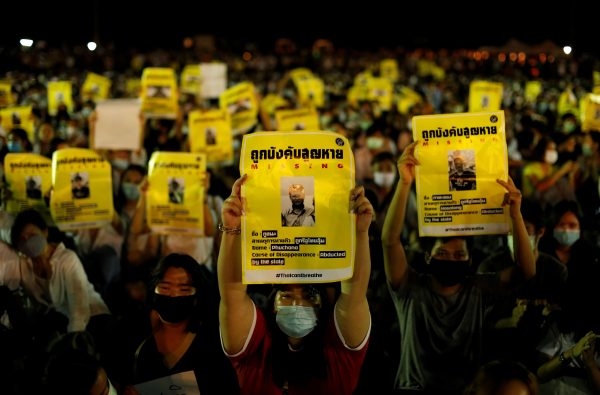Without the backing of a charismatic monarch, political gravity is pulling both the monarchy and the military-controlled government back to Earth.
Thailand’s youth have emerged as potential agents of change, unburdened by the baggage of the coloured-shirt era. Many were infants during the 2006 coup that brought down then prime minister Thaksin Shinawatra. Following Thailand’s apparent remarkable suppression of the COVID-19 pandemic, protests that commenced in January have resumed.
While numbers vary, the geographic scope and spontaneous origin of the protests, in schools and campuses across the country, is important. Some other sectors of society, such as unions, have started to show support. Protesters have three demands for the government: dissolve parliament, amend the constitution and cease threatening the people. More recently, reform of the monarchy is also increasingly appearing as an additional goal.
The trigger for the protests was the military’s flagrant disregard of the country’s own quarantine requirements. A group of Egyptian soldiers were allowed to transit the country and visit local markets without quarantine. Several later tested positive for COVID-19. Thais were furious at being asked to make sacrifices damaging their livelihoods only to see foreign ‘VIPs’ flout the rules. The extension of the restrictions, after several weeks of no new COVID-19 cases, also sowed suspicion about the intent of emergency regulations.
But there are a number of other factors driving the momentum of the student movement. The first is the suppression of democratic hope. In the 2019 election, the new and progressive Future Forward Party captured the support of young voters, ultimately securing over 80 parliamentary seats. Their message was simple: ‘no more military coups’. But the hounding and dissolution of the party over petty infringements in early 2020 dashed hopes. Far from quelling dissatisfaction, control of COVID-19 has allowed students to vent their outrage.
Second, the government is increasingly seen as bereft of economic talent and vision. The economy was weak going into the crisis and is now described as ‘broken’ (phang), having shrunk over eight per cent. Now, as the country desperately needs new ideas and drive to compensate for the loss of the two engines of growth — exports and tourism — they are treated to the spectacle of a strange bout of infighting within the military’s proxy party Phalang Pracharat.
Meanwhile, Thailand’s extreme and deepening income inequality has earned Prime Minister Prayut Chan-o-cha the unflattering sobriquet the ‘father of inequality’ (bida haeng khwamlueamlam). Thailand’s economic future is further dimmed by foreign investment shifting to neighbouring Vietnam, the stranglehold of an oligarchy of large Chinese–Thai conglomerates and an inefficient agricultural sector.
Third, there is some accumulated weariness after six years of military-dominated government. While some older voters were happy to allow coup-maker Prayut to continue for the sake of stability, many are tired of his imperious manner. He did not require the votes of the 250 appointed senators to take power, but their presence is a constant reminder of the undemocratic 2017 constitution. Their monthly salaries of 250,000 Thai baht (US$8029) are a further affront.
Fourth, the military itself remains out of touch. Its internal rot was exposed in the tragic Korat massacre — when a soldier, exploited by his commander and business partner, went on a shooting rampage. Army Commander in Chief and ardent monarchist Apirat Kongsompong is politically tone-deaf. His labelling of the student protesters as people who hate the nation (chang chati) was countered by former Future Forward leader Piyabutr Saengkanokkul, who skewered the hapless General with the rhetorical response ‘What is a nation for General Apirat? […] It is a place that has no people’.
Fifth, long-held questions about the ruling monarch, and indeed the entire royal family, are resurfacing. Questions have been circulating on social media for some time, with the ‘why do we need a king?’ hashtag implicitly criticising the King’s choice of Germany for his primary residence.
The student protests are creating a more permissive environment for voicing these criticisms. Many question why the King has been allowed to amend the constitution without the consent of the people, increase his personal control over the crown’s property to finance an exorbitant overseas lifestyle and dismantle public monuments in an attempt to airbrush the 1932 revolution out of Thai history. The idea that Thailand should have a truly modern monarchy, above the government but below the law, is regaining attention.
This situation has many of the elements that preceded the French Revolution, as well as Thailand’s own 1932 revolution: weak leadership, serious economic problems, resentment at gross inequality and a belief that sovereignty should rest with the people. The possibility of peaceful transition is possible if Thailand’s parliament comes together for the good of the country and shepherds true reform comprising a new constitution and genuine elections. The alternative — the use of violence against Thailand’s youth — is unthinkable.
Gregory V Raymond is a Lecturer in the Strategic and Defence Studies Centre at The Australian National University (ANU) and author of ‘Thai Military Power: A Culture of Strategic Accommodation’ (NIAS Press, 2018). He is lead author on the forthcoming book ‘The US-Thai Alliance and Asian International Relations: History, Memory And Current Developments’ (Routledge).

